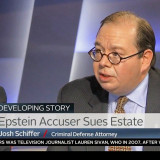Q: If I told an attorney (and provided proof) his client suborned perjury, are both those communication protected
If I advised a criminal defense attorney (not my attorney) that, it appears his client suborned perjury and I provide him proof of the questionable communication, are those communications* protected by attorney client privilege?
.I realize my confidentiality would not be protected. I am talking about his client’s.
*By “those communications”, I mean my communication with the attorney and his client’s communication with me.
In other words: Is the defense consul restricted by attorney-client privilege to only share those communications with his client OR . . .
. . . as an officer of the court, would he be obligated to share evidence of a new crime [a crime he wasn’t hired/assigned to (insert appropriate verb)] to the authorities?
If it matters: the hypothetical problematic communication was about the case he is hypothetically lead council on.
A:
Lawyers are allowed to use non-privileged communications as they see fit in their advocacy for their client. You reporting a "crime" their client may have previously committed would not necessarily force them to do anything, and how they use that information is up to their own ethical analysis.
I can see how in the future that Attorney may be forced to reveal your communication, however courts are very wary when it comes to accusing a lawyer of violating ethics and non-corroborated reporting of something as effusive as "lying/perjury" is going to be tough to start with.
It would be very different if the perjury/lying was reported to law enforcement or another court officer. Your one time allegation is nothing more than a notice of accusation, I imagine.
Tough issue and hard to do a full analysis without more facts.
Justia Ask a Lawyer is a forum for consumers to get answers to basic legal questions. Any information sent through Justia Ask a Lawyer is not secure and is done so on a non-confidential basis only.
The use of this website to ask questions or receive answers does not create an attorney–client relationship between you and Justia, or between you and any attorney who receives your information or responds to your questions, nor is it intended to create such a relationship. Additionally, no responses on this forum constitute legal advice, which must be tailored to the specific circumstances of each case. You should not act upon information provided in Justia Ask a Lawyer without seeking professional counsel from an attorney admitted or authorized to practice in your jurisdiction. Justia assumes no responsibility to any person who relies on information contained on or received through this site and disclaims all liability in respect to such information.
Justia cannot guarantee that the information on this website (including any legal information provided by an attorney through this service) is accurate, complete, or up-to-date. While we intend to make every attempt to keep the information on this site current, the owners of and contributors to this site make no claims, promises or guarantees about the accuracy, completeness or adequacy of the information contained in or linked to from this site.
